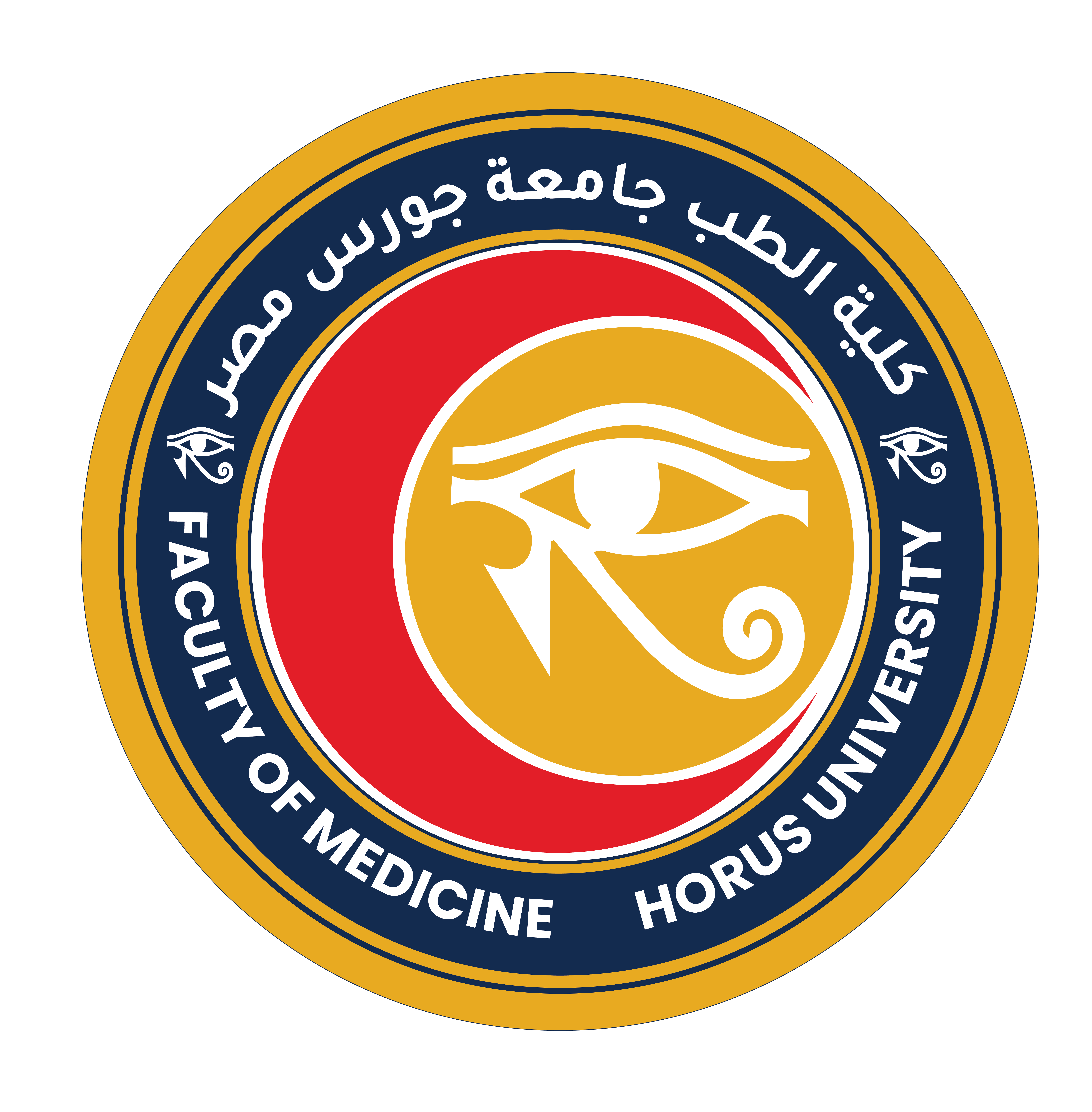Faculty of Medicine Sectors
Study system
Student Admission Regulations at the Faculty
A. Students Holding the Egyptian General Secondary Certificate
Applicants must hold the Egyptian General Secondary Certificate – Science Section – or an equivalent certificate recognized by the Supreme Council of Egyptian Universities and the Ministry of Higher Education, whether the certificate is from an Arab or foreign educational system.
B. International Students
The Faculty of Medicine at Horus University accepts international students who hold a certificate equivalent to the Egyptian General Secondary Certificate, provided that it is recognized by the Supreme Council of Egyptian Universities.
C. Students Transferring from Other Universities
The Faculty of Medicine at Horus University may accept transfer students from other faculties within Egyptian universities or from foreign universities and institutes recognized by the Supreme Council of Egyptian Universities, provided they meet the admission requirements stated in section A.
An academic equivalency process will be conducted to evaluate the scientific content of the courses previously studied by the applicant, in accordance with the university’s regulations.
D. Students Holding Higher Qualifications
The Faculty of Medicine at Horus University may accept students who already hold higher academic qualifications from other faculties as specified by the Supreme Council of Private and National Universities, with the approval of both the Faculty Council and the University Council.
The university adheres to the required time interval between obtaining the previous qualification and applying to the Faculty of Medicine, in accordance with the decision of the Supreme Council of Private and National Universities and with the approval of the Faculty Council.
All applicants must pass the medical and physical fitness tests determined by the university.
The university is committed to following the admission rules and regulations established by the Supreme Council of Private and National Universities
Language of Instruction
The English language is the medium of instruction at the Faculty of Medicine – Horus University. However, some courses (such as electives and Human Rights) may be taught in Arabic, subject to the approval of the Education and Student Affairs Committee and the Faculty Council.
Duration of Study
The duration of study for the Bachelor’s degree in Medicine and Surgery (5+2 system) is ten academic semesters distributed over five academic levels, with each level consisting of two semesters. Each semester includes a number of courses, each of which concludes with a separate examination. Students must pass the exams of each course individually.
Each academic semester ranges between 15 to 20 weeks, including the examination period.
This duration may be extended during the final years in accordance with clinical training requirements.
The Faculty Council may approve a summer semester in which a student may register for a maximum of 9 credit hours, which may be increased to 12 credit hours in the following cases:
• Repeating a failed course.
• Improving grades to raise the cumulative GPA (CGPA).
• Completing graduation requirements.
Credit Hour System
The undergraduate program is based on the credit hour system and academic semesters.
A credit hour is an academic unit used to measure the weight of a course, equivalent to:
• One theoretical lecture of one hour per week over a semester (15 hours).
• One practical session of two hours per week (30 hours).
• One clinical session of three hours per week (45 hours).
• One field activity of four hours (60 hours).
Academic Advising
The College Council, or its delegate, shall assign students enrolled in the college to academic advisors from among the faculty members and their assistants, based on the recommendation of the Education and Student Affairs Committee. The academic advisor may continue with the student until graduation.
The responsibilities and duties of the academic advisor are summarized as follows:
- Discussing the student’s academic interests, guiding and assisting them in selecting elective courses according to their circumstances, abilities, and preparedness. The academic advisor’s opinion is considered consultative or advisory, and the student is responsible for the courses they register for based on their own preferences.
- Discussing with the student their desire to drop, add, or replace any of the courses they have registered for during the first three weeks of the academic term, provided that such actions do not violate the designated study load.
- Assisting academically struggling students in overcoming their academic and social challenges, in accordance with the regulations approved by the College Council.
Academic Load
A. Students may choose to register for some of the semester’s courses and postpone others to the summer semester.
B. The academic load from the first to the sixth semester ranges between 18 to 22 credit hours and may reach up to 24 credit hours during extended semesters (seventh to tenth). The maximum for the summer semester is 9 credit hours.
C. The Faculty Council, with the approval of the University Council, may make exceptional decisions in accordance with the general rules of the Supreme Council of Universities.
Course Registration Rules
A. All transferred students must register for all core courses unless a request is submitted otherwise. Registration must be completed within the first week of the semester.
B. Elective courses are registered after consulting the academic advisor and meeting the registration requirements.
C. The student must adhere to the academic calendar issued by the faculty.
D. A student who fails to register for acceptable compelling reasons may register during an extended period not exceeding the second week of the semester.
E. A course with prerequisites cannot be registered until those prerequisites are successfully completed.
F. A student who fails a compulsory course may re-register for the course, attend it, and take its exam, with a maximum grade of 64.9%.
G. In the case of failing an elective course, the student may either retake the same course or select an alternative.
H. A student may re-register for up to four previously passed courses to improve the CGPA, with the higher grade being counted, subject to Faculty Council approval.
Course Modification and Withdrawal
A. A student may, with the academic advisor’s approval, modify (add, drop, or substitute) courses within the first three weeks of the semester, provided the academic load is maintained.
B. Emergency excuses for late registration are reviewed by the Education and Student Affairs Committee for approval.
C. A student who withdraws from a course with the Faculty Council’s approval shall not be considered as having failed and will receive a grade of ‘W’.
D. These modification rules do not apply to summer semester courses.
E. A student under investigation is not permitted to withdraw from the semester until the investigation is complete.
F. A student may submit a request for full withdrawal from all courses before the exams and will be considered deferred, retaining all prior grades.
G. The deferral period is not counted within the minimum required duration to obtain the degree.
Attendance
A. Study is mandatory and requires students to attend lectures, sessions, and activities regularly.
B. Students must attend at least 75% of sessions. If a student’s absence exceeds 25% without an acceptable excuse, and after receiving three consecutive warnings, they will be barred from the exam.
C. A student barred from an exam is considered to have failed the course and will receive an ‘F’ grade. When repeating the course and passing it, the maximum achievable grade is 64.9%.
D. If the absence is due to an accepted excuse, a ‘W’ grade is recorded, and the student must retake the course later.
E. In the case of adding a new course, attendance is calculated from the date of registration.
Interruption of Study
A. A student is considered to have interrupted study if they withdraw or are absent without an acceptable excuse.
B. An academic warning is issued for each semester of unexcused absence, and the student is considered to have failed.
C. If the absence is due to a certified compelling excuse, the student is granted another opportunity, and the interruption is counted within the allowed suspension periods.
Suspension of Registration
Registration may be suspended for compelling reasons for a maximum of four semesters throughout the study period, in accordance with Article (69) of the Executive Regulations.
Requests must be submitted before the start of the semester; retroactive requests are not accepted.
Registration cannot be suspended during final exams.
Disciplinary Actions and Dismissal
University Law and its Executive Regulations apply concerning disciplinary actions and student dismissal.
Students must maintain proper appearance, behavior, and online conduct on social media platforms.
Dismissal of students who exhaust their allowed failures is determined as follows:
• Level One: Maximum of two academic years.
• Levels Two and Three: Maximum of three academic years each.
• Level Four and above: Maximum of five academic years.
To contact and get more information

Prof. Dr. Maha Maher
Faculty Dean
welcome everybody who participates in building a future for our own country to help it take a considerably distinctive place among nations.


